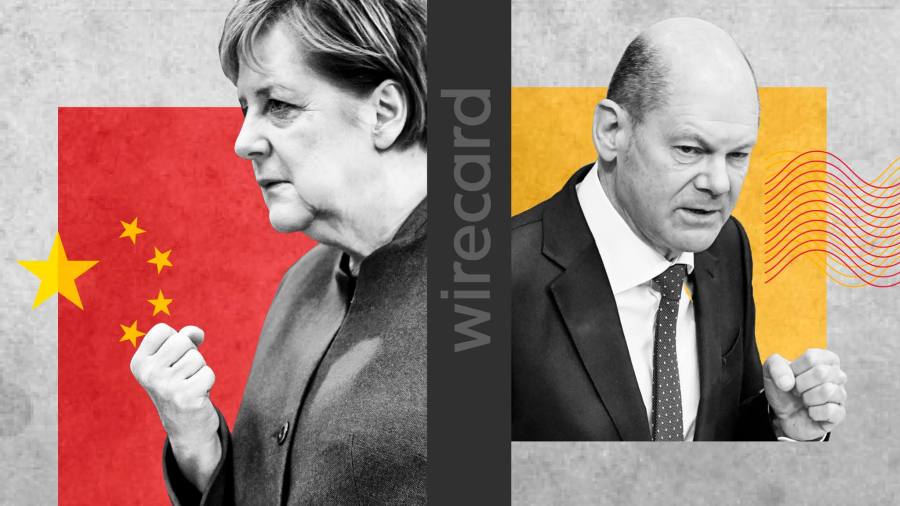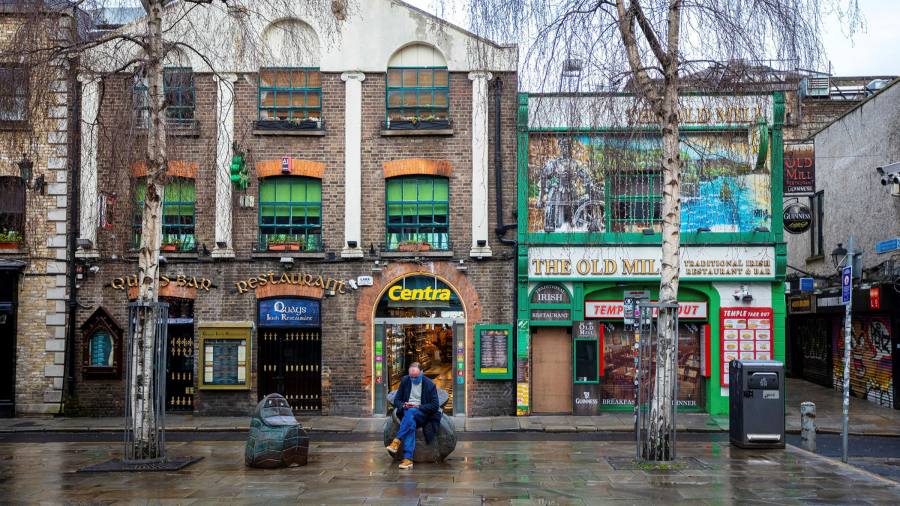[ad_1]
It was an innocuous question, posed shortly before midnight some nine hours into an exhausting parliamentary hearing into the Wirecard scandal.
“Did you ever actually own Wirecard shares?” Cansel Kiziltepe, the Social Democrat MP, asked Ralf Bose, head of Germany’s auditor watchdog Apas. His answer caused a political earthquake and brought an abrupt end to his more than 30-year career.
A former partner at KPMG, Bose ran a government agency that is normally protected from public scrutiny by stringent secrecy laws. But those laws do not apply to the Bundestag’s inquiry into Wirecard. Bose disclosed that he had bought and sold Wirecard stock while Apas was investigating Wirecard’s auditor EY. Just hours later the German government started to probe the transactions. And within a matter of weeks Bose had been fired.
His late-night admission last December was one of the high points of an inquiry that has electrified Berlin’s political class and has led to a swath of resignations among top regulators and financial executives.
“[With Bose] it was one of those moments when you knew there and then that this person would have to go,” says Matthias Hauer, one of the MPs leading the probe.
Constituted last October, the inquiry’s overriding objective is to find out why German regulators failed to spot one of the country’s worst ever cases of corporate fraud and take steps to prevent it — and to figure out how to stop it happening again. German authorities seemed blindsided when Wirecard announced last June that €1.9bn were missing from its accounts and days later collapsed into insolvency.
The inquiry reaches an emotional climax this week when MPs interrogate Germany’s two most powerful politicians — Angela Merkel, the veteran chancellor, and finance minister Olaf Scholz. Coming just five months before a national election — and at an extraordinarily fluid time in German politics — the encounters could shape the political debate for weeks to come.
MPs will want to know why Merkel lobbied for Wirecard in China when reports about suspected fraud at the company had been in the public domain for months. Scholz will be asked to explain how BaFin, the financial regulator he oversees, not only failed to uncover the Wirecard fraud but went after short-sellers and Financial Times journalists who first highlighted irregularities at the company.
Scholz, who is running as the Social Democrats’ candidate for chancellor in September’s election, has placed the bulk of the blame on Wirecard’s auditors. He has also sought to appease his critics by initiating a wide-ranging reform of financial regulation in Germany, substantially beefing up BaFin’s powers and poaching Mark Branson, the respected head of Swiss regulator Finma, as BaFin’s new head.

But that hasn’t dispelled lingering criticism of his ministry’s inaction before Wirecard’s collapse. Lisa Paus, one of the Green MPs on the inquiry, says Scholz was driven by a desire to nurture one of Germany’s rare examples of high-tech success.
“You have this impression that this was an emerging Dax company that the finance ministry wanted to somehow protect,” she says. “At all the critical junctures they decided in favour of Wirecard.”
The inquiry’s deliberations are ongoing, but they have already provided moments of high drama that have left MPs gasping in disbelief. They have expressed amazement at the scale of the Wirecard lobbying operation, with its network of former police chiefs, ministers and spymasters, and at revelations that BaFin employees traded Wirecard shares while the company was under investigation. They also expressed shock at the fanciful stories cooked up by Wirecard lawyers alleging journalists’ attempts to blackmail the company.
“The lockdown may have shut down all the theatres in Germany, but this inquiry has compensated for that in full,” says Michael Maier, a veteran Austro-German journalist and publisher of the Berliner Zeitung daily.
It will be many weeks before the committee’s members compile their final report, which needs to be published by the end of the parliamentary term in September. But one thing is already clear, MPs say: that the Wirecard scandal could have been prevented if authorities such as BaFin had connected the dots and not ignored the profusion of warning signs about the company’s suspicious behaviour.
“We can say today that there were compelling, substantiated indications of criminal activity at Wirecard, for our authorities, for BaFin, for prosecutors in Munich, for other supervisory agencies and also for politicians sitting in the finance ministry,” says Florian Toncar, an MP for the opposition Free Democrats.
Yet these weren’t acted upon. On the contrary, “state and sovereign institutions fell over themselves to be duped by a criminal gang”, says Fabio De Masi, a leftwing MP and one of the most prominent members of the investigative committee.
Dogged pursuit
The inquiry has been one of the most exhaustive ever undertaken by the Bundestag. Equipped with subpoena powers akin to those of criminal prosecutors, MPs have amassed nearly a terabyte of data and 174,000 pages of documents and interrogated more than 80 witnesses and experts, some of them repeatedly.
They have also mandated two special investigators, one to probe Wirecard’s connections to the law enforcement agencies and secret services, and another to evaluate the work of its auditor, EY, which resulted in a damning report.
Sometimes the hearings have verged on the theatre of the absurd — particularly the interrogation of former Wirecard chief executive Markus Braun, who was the inquiry’s first witness.
Braun, who had been summoned out of police custody and gave his address as “Augsburg penitentiary”, made clear he would not go beyond a brief introductory statement — but MPs interrogated him for a good three hours anyway. His robotic answers to some 150 questions alternated between, “I can’t answer this today”, “I exercise my right to remain silent” and, “I refer to my statement”. Braun even refused to confirm he had a daughter, or what the title of his PhD thesis was.

Though they made little headway with Braun, MPs have doggedly pursued lines of inquiry that have led to a string of resignations. The most prominent were BaFin head Felix Hufeld and his deputy Elisabeth Roegele, who were forced out in January.
Then there is Edgar Ernst, head of the accounting watchdog FREP: Hubert Barth, EY’s Germany head; Alexander Schütz, a member of the supervisory board of Deutsche Bank; Jana Hecker, UniCredit’s head of equity capital markets; and Commerzbank analyst Heike Pauls. Deutsche Bank’s head of audit Andreas Loetscher, a former EY partner who was in charge of the Wirecard audit, has also stepped aside. And of course there’s Bose, the former head of Apas, who was fired in mid-January.
“Judged on the number of resignations, the inquiry’s track record has been pretty respectable,” says De Masi.
The pressure has been relentless. In order to squeeze the proceedings into the final 11 months of a four-year parliamentary term, MPs have worked round-the-clock, with witness questioning often dragging into the early hours of the morning.
“Any sceptic of parliamentary democracy should attend one hearing, and they would immediately be converted,” says Maier.
‘Siding with criminals’
A key focus of the investigation has been BaFin’s controversial decision in February 2019 to impose a ban on the short selling of Wirecard shares, despite misgivings expressed by the Bundesbank, Germany’s central bank.
“That . . . was probably the biggest mistake our authorities made,” says Danyal Bayaz, a Green MP on the committee. “It was at that moment that they sided with criminals, and investigated journalists and market participants who were posing critical questions.”
But none of Germany’s regulatory authorities have emerged from the Wirecard proceedings with their reputation unscathed. The Munich criminal prosecutors currently investigating Markus Braun and other Wirecard executives for fraud have also come under mounting scrutiny.

MPs have criticised them for failing to issue an arrest warrant for Jan Marsalek, Wirecard’s former chief operating officer, on the day the company revealed the massive hole in its balance sheet. Marsalek, who is considered one of the masterminds of the fraud and is currently on an Interpol wanted list, was able to flee to the Belarusian capital Minsk and has not been seen or heard of since.
The Munich prosecutors’ role in the BaFin short selling-ban has also proved controversial. The chief prosecutor Hildegard Bäumler-Hösl told MPs that two years ago she had a curious phone call with a star Munich lawyer who was working for Wirecard. He told her that Bloomberg reporters had attempted to blackmail the payments company: they purportedly threatened to “take up an offer from the FT” and publish negative stories about Wirecard, unless it paid them €6m.
Bäumler-Hösl sent a memo to BaFin summarising the information. Fearing a so-called “short attack” on Wirecard, BaFin then issued its now infamous short selling ban, which appeared to suggest Wirecard’s biggest problem was the speculators betting on its falling share price rather than the allegations of fraud swirling round the company.
But the blackmail story was a fiction. Chats unearthed by MPs on the messaging platform Telegram between Marsalek and the head of Wirecard’s legal department show “that he dreamt up this whole story himself”, says Jens Zimmermann, a Social Democrat MP on the investigative committee.
Bäumler-Hösl insisted in parliament that her team had simply passed on the information to BaFin without assessing its accuracy. BaFin, on the other hand, said prosecutors stressed in a number of phone calls that they deemed the information credible. Yet in a letter to Bloomberg at the time, Wirecard itself cast doubt on the veracity of the blackmail claim. Bloomberg has also denied its reporters ever tried to pressure Wirecard.
“Everyone on the committee was surprised a story which was invented by Wirecard . . . ended up being the cause of the short selling ban,” says Zimmermann.

‘Too big and complex’
Other agencies have also been found wanting, such as the money-laundering authority in Lower Bavaria where Wirecard was based. MPs were shocked at how ill-equipped it was to supervise a company of such complexity. It even lacked a comprehensive database of the firms under its jurisdiction.
“You have six to seven full-time employees who oversee thousands of car dealers and estate agents,” says Hauer. “How are they supposed to supervise a Dax-listed company with 58 subsidiaries, many of them based abroad?”
Germany’ accounting watchdog FREP has also been in the MPs’ crosshairs. Its outgoing head, Ernst, admitted to MPs that the body, which was founded in the aftermath of the Enron accounting fraud, lacked the resources to conduct forensic audits on questionable companies. Ernst said FREP’s budget was deliberately kept small to limit the financial burden on German companies, which fund the body.
Yet in early 2019, BaFin asked FREP to investigate Wirecard’s accounts. It was still waiting for the agency’s report in June the following year, when Wirecard collapsed into insolvency.
“FREP is definitely one of the culprits, because they knew Wirecard was too big and too complex for them to deal with and still they didn’t say anything,” says Zimmermann.
FREP’s woes climaxed earlier this year when the inquiry committee revealed that Ernst had ignored the agency’s strict corporate governance rules. He told MPs he had joined the supervisory board of German wholesaler Metro despite a rule imposed in 2016 that barred the agency’s staff from taking on any more outside directorships. In February he was forced to step down.
Another casualty was Schütz, the member of Deutsche Bank’s supervisory board. His fate was sealed in mid-January, when MPs on the investigation committee questioned Deutsche Bank chief executive Christian Sewing.
Zimmermann confronted him with an email sent by Schütz to Braun in early 2019, just after the Financial Times had reported whistleblower allegations of accounting fraud in Singapore. Schütz told Braun he had recently bought additional shares in Wirecard, and urged Braun to “do this newspaper in!! :-)”. The advice was striking considering Wirecard’s reputation for intimidating, spying on and hacking its critics.
A flustered Sewing declined to comment on the email. But Deutsche later described it as “unacceptable” and Schütz later announced his resignation from the bank’s board.
For MPs, the Schütz correspondence showed the extent of Wirecard’s vast network of businessmen, politicians and lobbyists. One of those on its payroll was Waldemar Kindler, the former Bavarian chief of police. Lawmakers discovered during the inquiry that he used his influence to procure a firearms licence for Braun’s driver.
“You maybe expect that kind of thing in Sicily, but not in Bavaria,” says Maier.
Another adviser lavishly paid by Wirecard for his services was the former German defence minister Karl-Theodor zu Guttenberg. He asked Merkel in September 2019 to intercede for Wirecard over an acquisition it was making in China. The chancellor duly raised the issue on her official trip to China a few days later.
Hans Michelbach, an MP for the governing CDU/CSU bloc, says the inquiry had revealed that Wirecard spent €62.4m just in the four years from 2016 until 2020 on lobbying activities — an unusually large figure for a German company.
“The fact that former ministers, state secretaries, a former police chief and an active Berlin politician all allowed themselves to be harnessed by Wirecard leaves me speechless,” he says.
None of their efforts were able to save Wirecard, whose collapse wiped out €24bn in market value. “That was the money of small investors . . . people who now have to get up at 5am and do a double shift because their family savings were destroyed,” says De Masi.
He says he and his colleagues feel they owe it to those people to get to the bottom of the Wirecard debacle — even if it often means working until the small hours to do so.
[ad_2]
Source link


